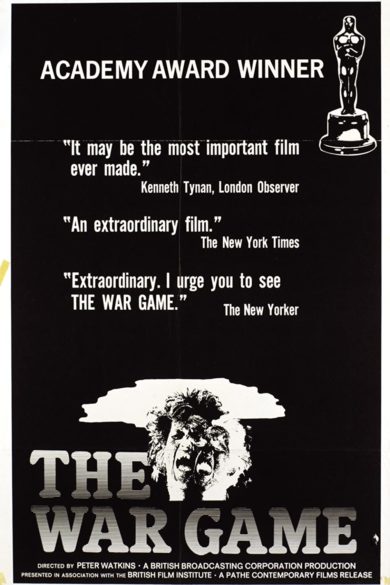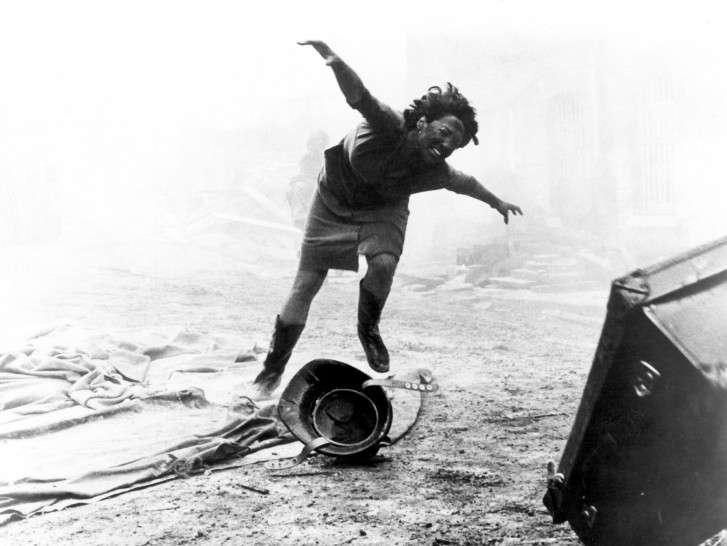 A profoundly shattering, staunchly reality-based look at the effects of a possible nuclear war on Great Britain. Completed in 1965, THE WAR GAME was the brainchild of Britain’s Peter Watkins, at the time a director for the BBC (for whom he made the award-winning historical chronicle CULLODEN a year earlier).
A profoundly shattering, staunchly reality-based look at the effects of a possible nuclear war on Great Britain. Completed in 1965, THE WAR GAME was the brainchild of Britain’s Peter Watkins, at the time a director for the BBC (for whom he made the award-winning historical chronicle CULLODEN a year earlier).
Watkins had wanted to examine the consequences of a nuclear war since 1961, and the resulting 49-minute film was the result of years of research into the subject. It won the 1967 Academy Award for Best Documentary, yet the BBC’s overseers, under pressure from the government, banned THE WAR GAME until 1985. This precipitated Watkins’ career-long rebellion against the BBC and mainstream media in general; subsequent films made by Watkins include PRIVILEGE (1967), THE GLADIATORS (1969), PUNISHMENT PARK (1971), EDWARD MUNCH (1974) and LA COMMUNE (2000), all bearing the unique mock-documentary style pioneered by THE WAR GAME—which, I’d argue, remains Watkins’ masterpiece.
It won the 1967 Academy Award for Best Documentary, yet the BBC’s overseers, under pressure from the government, banned THE WAR GAME until 1985.
The setting is the “present” year 1965, when the cold war has apparently reached its height and a nuclear exchange is brewing between the United States—and by extension the UK—and the Soviet Union. British authorities evacuate people living in targeted areas and force others to take them in, regardless of whether those homeowners have sufficient resources. Even worse, many jerks are hawking sandbags and other emergency supplies at absurdly inflated prices.
When the nuclear warheads finally hit the outskirts of Britain there’s little-to-no advance warning, and many citizens are caught off-guard. A little boy has his eyes severely burned from looking at the blast and many people are driven mad by the shockwave that occurs twelve seconds later, with a noise that’s likened to “the slamming of giant door in the depths of Hell.”
Click here to watch entire film.
Firestorms engulf the cities, killing untold numbers of people. The ranks of wounded individuals far out-number the doctors on hand, so the most severely maimed are simply executed by police. Mass rioting follows as hundreds find themselves without sufficient food or water, while others give into despair or lapse into “permanent neuroses.” And then there are the children, who will have to live the rest of their lives bearing the scars, physical and emotional, of nuclear war.
So accomplished is this film that it still packs a serious punch after five decades, with the power of its images transcending time and borders. It’s presented as a documentary—complete with a disarmingly rational off-screen narrator, talking head commentators and on-the-spot interviews that frequently interrupt the action—and the illusion is flawlessly sustained, so much so that the technical raggedness and amateurish performances enhance rather than detract from the overall effect.
So accomplished is this film that it still packs a serious punch after five decades…
While THE WAR GAME no doubt seemed up-to-date in 1965, it has a different feel today. Now, with its scratched-up black-and-white film stock, it feels like an artifact heralding a stern warning to future generations—plus, it’s been echoed (if not outdone) in subsequent years by a number of nuke-themed films, most notably THREADS (1984). Yet even if time hasn’t been entirely kind to it, THE WAR GAME is as chilling a piece of cinema as any you’re likely to see. Even more sobering is the fact that, with today’s advanced weaponry, were a nuclear war to occur now the devastation would likely be far worse than what’s depicted here.
Vital Statistics
THE WAR GAME
British Broadcasting Corporation
Director/Producer/Screenplay: Peter Watkins
Cinematography: Peter Bartlett, Peter Suschitzky
Editing: Michael Bradsell
Cast: Michael Aspel, Peter Graham, Dave Baldwin, Kathy Staff, Peter Watkins

